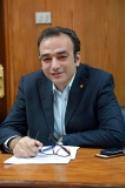
Biography:
Dr. Tarek Youssef Ahmed Youssef is an experienced Assistant professor of general surgery in Ain Shams University interested laparoscopic colorectal Surgery and researches for trauma prevention as well as breast surgery. He has teaching responsibilities to the 6th year students of the faculty of medicine and for training of the junior surgical residents and responsible for elective surgical lists and one day ER per week. He has a Master degree of General surgery in 2003, Membership of Royal College of Surgeons (MRCS) England in December 2007 and the MRCPS of Glasgow in May 2008, MD degree in general surgery from Ain Shams University in November 2008 and a Master of Mini-invasive Surgery from university of Catania- Italy in December 2009. He had acquired the fellowship of the American college of surgeons in 2015.
He is Member of the Egyptian society of laparoscopic surgery (ESLS) and Member of the Egyptian society of the colorectal surgery. Also he is a Member of the Mediterranean & Middle Eastern Endoscopic Association (MMESA).
He had the following courses: University lecturer preparation course from Ain Shams University, Work and profession ethics course. He completed the Sequential Trauma Educational Program (University of Maryland) and now he is working as a trainer in this course in Egypt. He had Researched his M.Sc, in Recent Trends in Laparoscopic Repair of Inguinal Hernia and MD thesis in Value and Results of Endoscopic dilatation Versus Cardiomyotomy in Patients with Achalasia of the Oesophagus. Also he worked as a general surgery and surgical emergency specialist in Egyptair hospital, Nozha International Hospital, Shekh Zaied Specialized Hospital. Also he had published a lot of international and local publications in Laparoscopic and colorectal surgery.
Abstract:
Laparoscopic colorectal surgery is technically feasible; however it needs a long learning curve. Despite the obvious benefits, acceptance of the laparoscopic approach for malignant disease has been gradual. This is mainly because of fear of breaching oncological safety. Early problems during laparoscopic colectomy necessitating conversion were related to poor instrumentation; however, innovations by surgeons and industry have led the surgical field towards a scarless surgery.